Guides & Toolkits
|
A Guide to Incorporating a Poverty Lens to Research and Engagement The purpose of this document is to serve as a toolkit or resource for how to incorporate a poverty lens in research and engagement. This document describes why it is important to consider incorporating a poverty lens in research and engagement activities, even in projects not directly related to poverty, and provides practical examples of how this can be done.
|
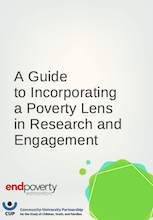 |
|
RAISED Between Cultures: Video and A Knowledge Reflection Guidebook for intercultural practice in the early years The RAISED Between Cultures model was designed to promote intercultural practice and reflection when working with culturally diverse children and families. It highlights the importance of possessing a deep understanding of cultural backgrounds, experiences, and migration challenges, as well as family strengths to support children's learning and development. RAISED Between Cultures Video Research Project: Multicultural Early Childhood Assessment and Learning (MECAL) project
|
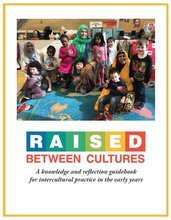 |
|
Resiliency Resolve Results: FFE Collaboration Handbook Families First Edmonton was a collaborative involving 14 partner organizations representing government, research, funders and community agencies. The project explored how to work together across systems and organizations to better deliver existing services to families with low incomes. The partners came together to provide evidence-based research on four different ways of delivering services to families with low incomes to see if better family outcomes can be achieved. This handbook shares the joys and setbacks involved in partnership work and attests to how much was learned from and with each other. Research Project: Families First Edmonton
|
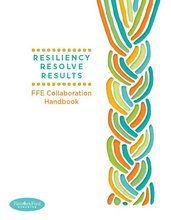 |
|
Cross Cultural Lessons Handbook A handbook to help the early childhood development community, teachers, service providers, researchers, clinicians, and local and provincial governments that serve immigrant and refugee families. The handbook highlights the major issues related to the use of North American screening tools with immigrant and refugee children and provides useful lessons on cross cultural approaches to research and practice to understand the invisible realities that influence parental responses to questions on developmental screening tools. Research Project: Early Childhood Screening in Immigrant and Refugee Families
|
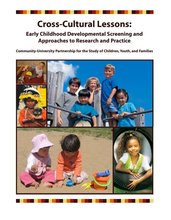 |
|
Recruitment and Engagement of Low-Income Populations: Service Provider and Researcher Perspectives How to connect with low-income populations in order for them to participate in a program or research project is a challenge among community program planners, policymakers and researchers. The report includes a discussion on recruitment, use of incentives, challenges, as well as retention and communication strategies. Research Project: Recruiting Vulnerable Populations
|
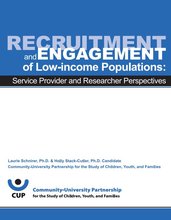 |
|
Knowledge Sharing Handbook This handbook was created as a resource for those interested in knowledge sharing among researchers, policymakers, service providers, and the public. This handbook was formulated using existing knowledge-sharing resources, which were collected, reviewed, and summarized. In addition, CUP's experiences working with researchers, policymakers, and service providers have informed the development of this handbook. The target audience for this handbook includes those struggling with knowledge sharing among researchers, policymakers, and service providers in the health and social science fields. This book represents an attempt to bring together the diversity of information that was scattered across books, journals, and organizations into a logical, accessible resource, which will hopefully be a useful tool to those engaged in knowledge sharing Research Project: Mobilizing Knowledge About Development (MKAD)
|
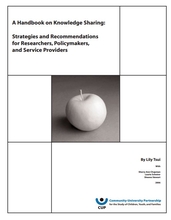 |
|
Essentials of Qualitative Inquiry, Second Edition This brief, inexpensive guide introduces students and novices to the key elements of qualitative research methods. Written in a friendly, conversational style, replete with good examples from multiple disciplines, student exercises, and key points to remember, the volume works ideally with other qualitative textbooks to provide a comprehensive overview to qualitative methods for students. Chapters cover the essentials of theory building, research design, methods, data collection and analysis, writing, ethics, rigor and proposal writing. This book can be purchased through a variety of outlets.
|
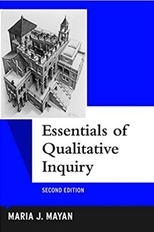 |
|
Families First Edmonton Tool Kit This Toolkit provides information about the Service Delivery component of the Families First Edmonton Research Project. It includes practical information about the operations and service delivery practices, essential contextual background to the research project, the principles that guided service delivery, and the learnings and recommendations from the service delivery team. The Toolkit is intended to provide information and insight into how our service delivery was achieved, with the hopes that it will be useful to others who may want to replicate the practices in new or current programs. Research Project: Families First Edmonton |
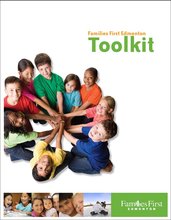 |